TRANSCRIPT:
(This transcript is derived from an automated process. The video recording is authoritative.)
Jim Wilmott:
Yep. Hi everyone. Thanks for that introduction Campbell. Yep. Look, I'm passionate about Australia. I love Australia. I love our heritage and I'm indigenous. My mum was a shearers cook and my dad was a sheer and we've travelled right throughout Australia and settled in the great place of Queensland and what I see happening in rural and regional Queensland now is that the morale is down across a lot of different sectors. The morale, we're not proud as we used to be. The level of volunteerism is down. PNCs aren't have enough people. The rural fire, rural fire brigade bureaucracy of government is killing us. We are drowning under the burden of red tape bureaucrats. Now tonight is all about red tape. Tonight is all about what the government is doing to divide us as a nation when we have a history of being united as a country. Now I've been speaking up my role as a chair of Property Rights Australia. One of our fundamental principles, the thing that we are based on is that everyone should have the exclusive access and use and the opportunity to make a profit off their land. There I say it and it's the fundamental protection of that right?
For what should be a prosperous society. And we're seeing that under risks now and we can say native title or things under the transfers, under the Aborigine Land Act. People saying, well, it's not going to affect me. It won't affect me because it doesn't affect freehold land. But what happens if you had a nice park next door, you can't go to anymore or you used to go through the esplanade and walk down the beach. You can't do that anymore. What happens then? What happens if you used to go and run horses on a reserve or go down to your favourite fishing spot or drive along the beach? Australia should be for all Australians. What we are seeing from these governments, the state government is a lack of respect for people's property rights. They don't respect that. Whether it's the reckless rollout of renewables
And I can all night about that or not talking to communities, not consulting with the communities in this transfer of state government land to Aborigine freehold. These two fellas here, they only found out by accident. There wasn't a transparent consultation process to the people that were going to be directly affected. So how's that? How ridiculous. If we're talking about going together as one and looking at reconciliation, reconciliation, this is the worst way to do it. This is how to divide us when you're not even talking to the people it's going to directly affect. If it's going to lock Australians out, we're outdoor people. We
Love the outdoors, we love climbing mountains. We love going down to the beach. We love going to our favourite fishing spot. If they're going to lock us out of those places, what's that going to do to us as a community? It will divide us and that is what they want us to do. It's like a recipe that they've come up with from somewhere. How to divide a community and get one fighting with another. That is what is happening now. So look, I won't talk too much. I want to call on Michael Offerdahl to come up and he's the publican of the Toobeah Pub to tell his story.
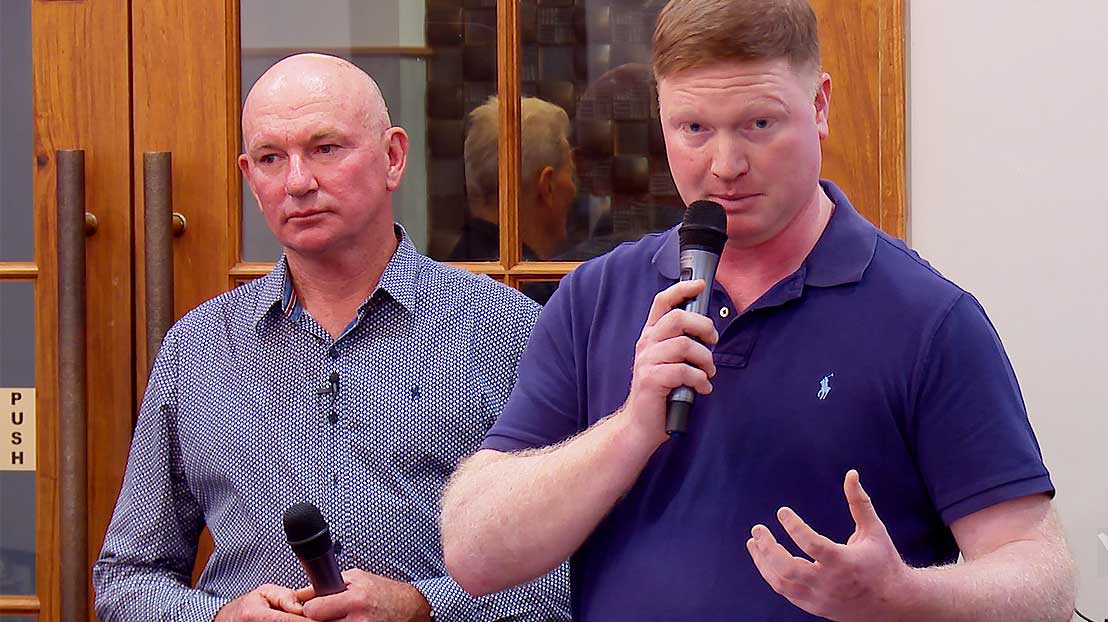
Michael Offerdahl:
Hey everyone, how youse going? So yeah, basically in Tooby what's happened to us is we sort found out by chance what was happening there when we were trying to buy a little bit of state land next to some land we had and we sort were told by resources that there was no don't apply is what they said we could we ask why and I said, I can't tell you. So obviously that's when we knew something funny was going on. So we followed the process through. From there we basically got to a point where we were told in January this year that we were losing what 95% of our town, which is what this camping reserve comprises. So I'm not great with microphones. Is that that on?
Yeah. So anyway, this camping reserves like part of our town. So our town doesn't have sewerage, we can't drink the water, we don't have a park or anything. It's just a handful of houses that were built on a sort railway town as sort expanding the railway line to. So all of that sort of tile, I think that paints the picture of where we are. So basically they've dump these minutes out and then we've sort of gone, oh shit, this doesn't look real good. And we've sort of gone into the council and said, Mr. Springboard, what's going on here? Can you help us out man, you're a pretty sort of famous kind of dude. You've done a fair bit of stuff. Anyway, he sort of said, oh mate, we've done the best we can anyway, I think his words were, we had no horses to trade but we'd turned up with a horse and got this little bit of freehold land here and they just basically gave us another street, which is sort of pointless when you don't have a series of water for the existing streets Anyway, so it was just to sort of meet the criteria to make aboriginal freehold accessible, sort of what that's all about.
Anyway, so we rang the resources apartment and had a bit of a chat with this lady, had a few conversations with her and wear her down a little bit and she basically said, I put her in my position. I said, imagine you lived in a little town like mine and that's all you had in the world. All your family had that was everything you had was there. And then someone just came and said, we're going to change all that. We're going to lock you out of this creek. You're not going to able to go fishing there, you can't swim there, you can't take your kids there. The 120 years of history that we have with that piece of land is just gone and for no recourse and no benefit. In our instance, the aboriginal corporation doesn't actually even live in the area, so they come from Brisbane ly.
I know it. It's a bloody strange one. So that's the big corporation, the actual native people area, the Camilla and Toobeah means to point in Camilla. So it sort of, I don't know how they missed all that. Anyway, so the Camilla Roy are obviously quite left out of this as much as we are because this corporation that obviously is really good at doing aboriginal corporation stuff's managed to take all this land. So they're actually trying to take the St George now as well. Parts of that. Yeah, it's pretty crazy. So yeah, we're pretty lucky in our circumstance though because they've done such a dodgy job of it all, it's quite clear and obvious the process that they've gone through where obviously struggling with is in our circumstance. Our mayor's pretty, he's up there, he's the president of Queensland, l and p. He should have enough call that he could be able to, I reckon he can make a little bit of a commitment to some legislative amendments here that will require line. He won't do it though. He won't even bloody talk to us. Use this.
Keep going actually like hearing stuff. So basically just filling a bit more there. That l and p process of all of this is we went to our state member, which is James Lister, he's a member for Southern Downs, we known know and I said James, man, this is pretty bad. I dunno what I'm doing. I'm just publican two here still from school. I'm not really up on this stuff. Sorry guys, where you're in, you've got a listen of the story now. So enjoy this. Anyway, said to him, I said, James, we really need some help here man. I reckon this is sort of your job. I've asked Lawrence and council, they don't want to help us. Can you help me mate? He's actually give me one of the most inspirational speeches that I've ever been given. It was terrific. He said, it's pretty bad. He said, Michael, I only fight fights I can win, and I can't win this one.
So obviously I thought I was in a little bit of trouble at that point. So we went forward from there and we started obviously hassling everyone and we're thankful enough to get Jim and Campbell and others to come and give us a hand and we got that question on notice through Jim, which was really cool. So we found it as 15 towns that are under the same thread as us already the courier male put in a friend of information request for the 15 downs and they were denied the answer obviously. So yeah, that's how we found the Fraser Island guys. Hey, he's pretty cool. They're in the same circumstances as us, so you'll hear from that in the minute. I probably shouldn't jump into all of that too much. Yeah, it's basically where we are. So l and p president trying to deliver treaty, what's going on there? He said, knocked over, you don't support treaty, where are we? And we don't seem to be able to really get anyone to call him out or call that situation out. It is really, really strange and it's obviously why we're here asking for everyone to give us a bit of a bloody hand. Hey, so yeah, not much else I can say there.
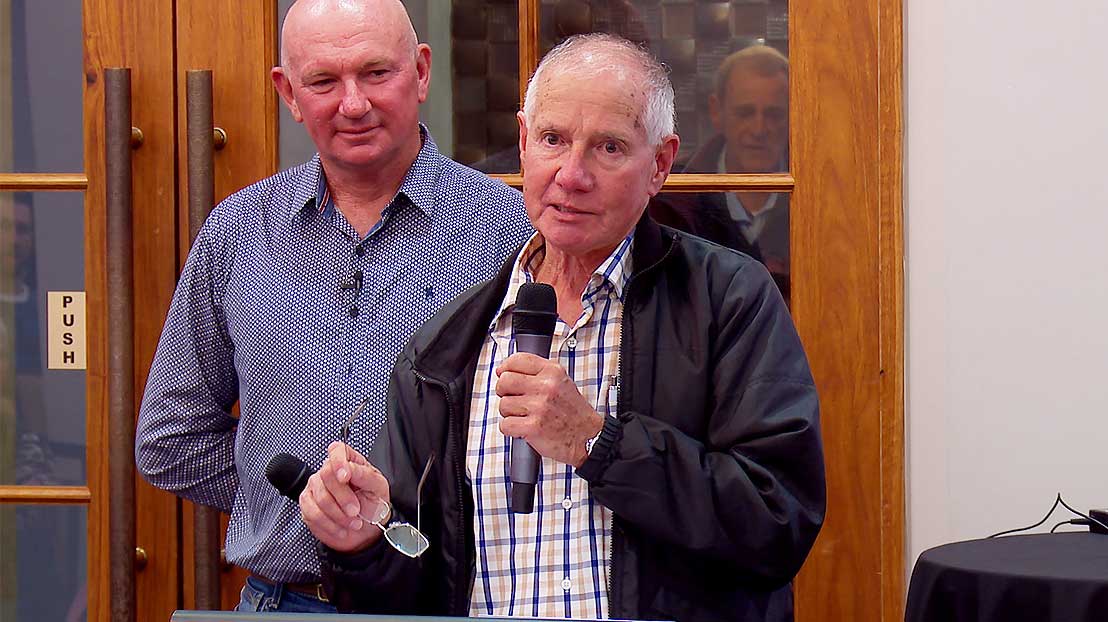
David Anderson:
Thank you. My only claim of fame really is that I live on little island called Fraser and a township called Eurong. I'd like to begin by just asking you all something if you wouldn't mind. I've got two parcels of land adding up to about 500 hectares.
The land is adjacent to a national park. Each block is adjacent to a township, a township that has a shop, fuel, restaurant. I'm in a position to offer you, free of charge, those blocks of land, no strings attached. What I need from you is to say would you be interested, yes or no. But why not? Now the question then comes down to: where's the land? The land is on World Heritage listed Fraser Island with some other name now.
The towns are Happy Valley and Eurong. Who's asking? I am the Queensland Government's Department of Resources and I no longer want to take responsibility for those blocks of land. I'm the Department of Resources, yet ironically, I have no human resources. I have no financial resources to care for that land. Therefore I'm giving it away.
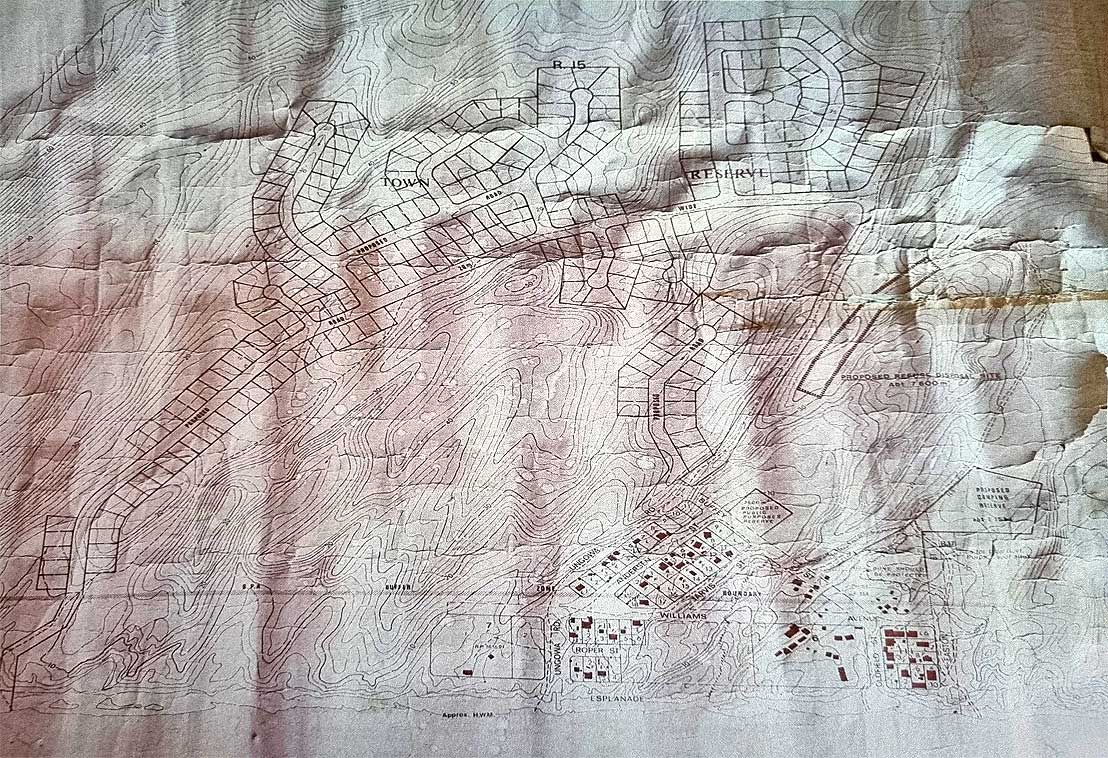
In 1962, the townships of Happy Valley and Eurong were surveyed and set up as township reserves. They should have been reserves. Happy Valley Reserve 14, and Eurong Reserve 15. That was in 1961- 62 when the land was released. The Township reserve of Eurong I can talk about with a bit more authority than I can about Happy Valley. (Shows map) It's represented by that strange shape. That's the total township reserve as it was, as it appears on all maps in Queensland ... for the last, I don't know, as long as 60 years. In the little pocket up the top right hand corner is the actual settlement itself. Last year, last year, despite the fact that we had requested a small portion of the total area of USL that surrounds the township or the settlement area ... despite the fact that we asked for 2% of the total of 270 hectares of USL in and around Eurong, we got dibbly squat. We asked for that block there ... lots 46 and that block there ... 60 which lies between the two valleys. This area here is the Eurong resort valley. This is what we call the residential valley. There are also a couple of residents or properties over the other side. We asked for that. We also asked for a small piece of land at the end of Buffey Street just for future community purposes and infrastructure
Without any further consultation any than that, they just suddenly told us that the land had been transferred so that now, and that there, is Aboriginal freehold. It's happened. It's not something that's going to happen. It's actually happened. It happened despite the fact that we had asked for that. It sounds like a reasonable sort of thing. We didn't want all the other land around the back of it. Again, I can't go back. We didn't want, we weren't worried about all the rest of that land. Of the USL, we wanted 2%. So far we've got nothing. They've got those two blocks that we asked for. What could have been ... in the seventies, the Land Administration Commission, as it was then, requested the surveyors to set up an extension of the Eurong Township. This was the legend. I copied that and I do apologise for the quality of the reproduction. That's another story. But if you can't see it, you might not be able to look hard enough. You'll see that there are 255 extra lots that they've mapped that just shows you what ... I'll go back again. That's the township as it is now and that's the extension on that plan. Of course that didn't happen. It just reverted back to the USL and that's when there was a Maryborough City council looking after Eurong and Hervey Bay City Council looking after Happy Valley. Once the amalgamation happened to the Fraser Coast Council, that externsion was no longer anywhere near the agenda.
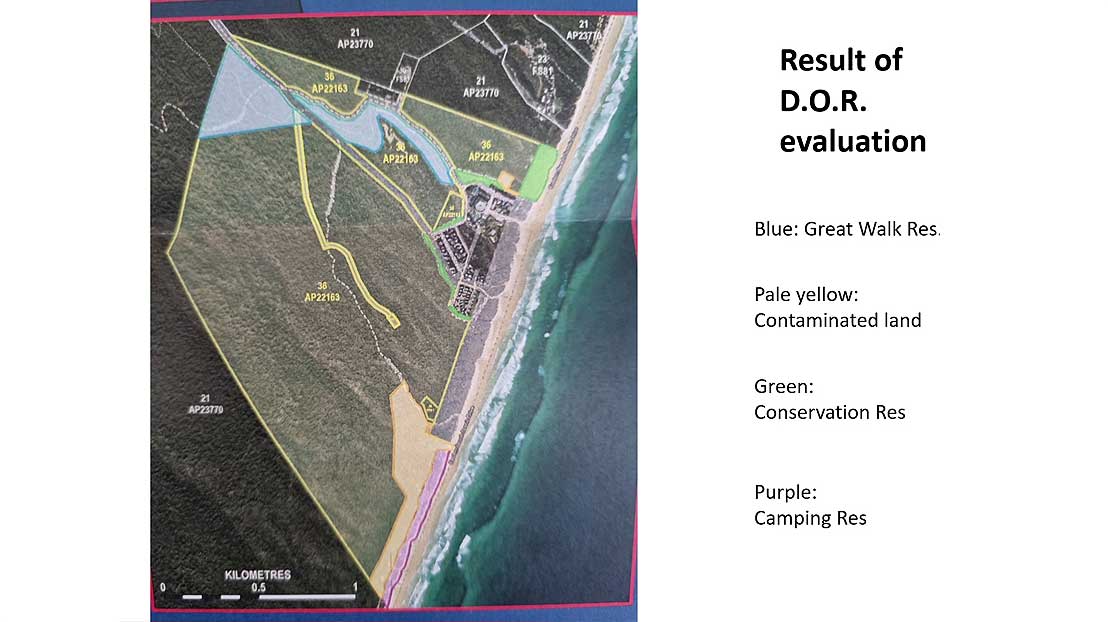
Two weeks ago, we had an information day. That's all it said, an information meeting with the two communities with the Butchulla Aboriginal Corporation and the department and they just presented us with that map. "This is how we've evaluated the USL in and around Eurong". The blue area, that's where the great walk goes through from the resort valley into the national park. They haven't yet surveyed that. That's why it's in wiggley lines. They haven't worked out exactly what shape it's going to take, how much land it's going to need. The pale yellow in two spots at this end here and that end. There's a tiny one there, shaped like a leaf that is contaminated land. That's where there were some illegal dumping. People in Eurong dumped stuff there and people coming off the island from all over the island dumped stuff on the open dunes. It was quite a mess. Disgusting. It happened. And that land's contaminated. It's going to be saved as USL, as contaminated land. Can't be dealt with at all, can't be sold. All that in green in a couple of sections ... that green follows the dingo fence. The dingo fence around the community, is not to protect the people from the dingoes, but to protect the dingoes from the people. But that's another story.
We now have, or we will have the privilege of being able to walk from our houses to the dingo fence. We can walk down the esplanade to the beach. We can walk up one road, or two roads or up the great walk into the national park. Or we can hop in our cars and drive to the national park. That green bit up there is another piece of conservation reserve, but that's going to be for cultural purposes and the tenure will be with the aboriginal corporation. The purple area here is actually a QPWS camping ground called Wongi and that is going to be handed over to the BAC and still will be a camping ground, but they'll be able to collect the dollars. So if you get a camping permit from the Department of National Parks to go to the island and camp, you won't be on the park. Your permit won't allow you to camp in that area. You'll have to go and pay the aboriginal land holders.
Land next to contaminated land. Yep, good start. They do that already, so people didn't know that before. So it's all covered over with sand and vegetation. (Show photo)This is what we can't any longer access. In those two lots of land between the two valleys is bushland, and in that bushland is a magic tree, a fig tree that has grown up and this branch here actually links up and another tree has grown up out of it. And the other one's grown up over the other side as well. So it is a collection of trees coming from mother tree.
But the good thing is children love that tree. You can see in the background there there's a tyre swing still there.
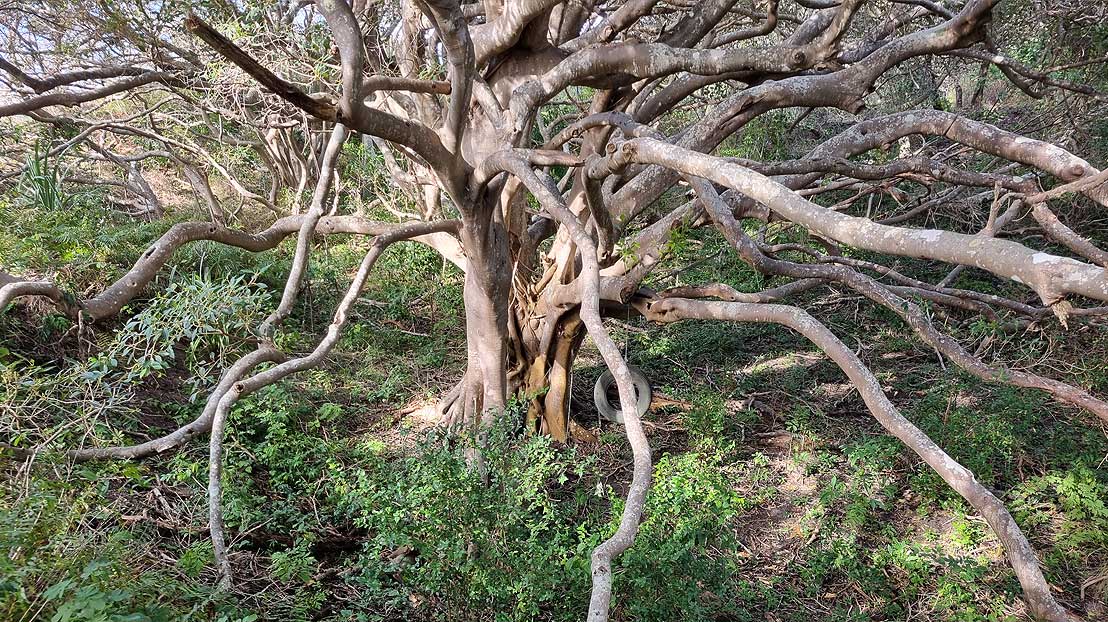
Now I have to confess, that on the weekend, I took my grandchildren and my great-grandchild over to the land that belongs to the Aboriginal people. I ignored a sign that says "trespasses will be speared" to show them what they'll miss. And I was also a little bit concerned about the amount of weeds that have grown up in the 12 months. Might see a bit of cassia here. There's a little bit of Brazillian nightshade, I think that's there's also other stuff in there. All weeds, despite the fact that that was my job, self-appointed job, to weed that area before it became Aboriginal freehold. I haven't touched it since and I'm not going to go on their land. (Show photo) And that's how flexible those branches are. That swings, literally swings if you're sitting there. That actually swings back and forth.
And these other ones you can hop on, they only go so far. You can hop on that like a see saw. It just bounces up and down. And it's also, you can probably imagine, a great climbing tree and there were times during school holidays when that was alive with children, climbing and playing on that tree. And that area was all clear down the bottom. So it's just one of those little places that we can no longer get access to.
So the proposed Aboriginal freehold, along what's called the up road, which is going to be absorbed into the Aboriginal freehold, is what we call the arch tree. And it's one of those favourite spots where we photograph people, we have visitors over, we get them to stand under the arch, which makes a nice little photograph. It's something we will never be able to get to see once it becomes Aboriginal freehold. And alongside that road is a rare sight. Every year we'd find one or two of these elegant hyacinth orchids, growing leafless with a symbiotic relationship with the humus in the soil.
So as I said, I live on Fraser Island. I'm going to miss all that and I'm cranky about it.
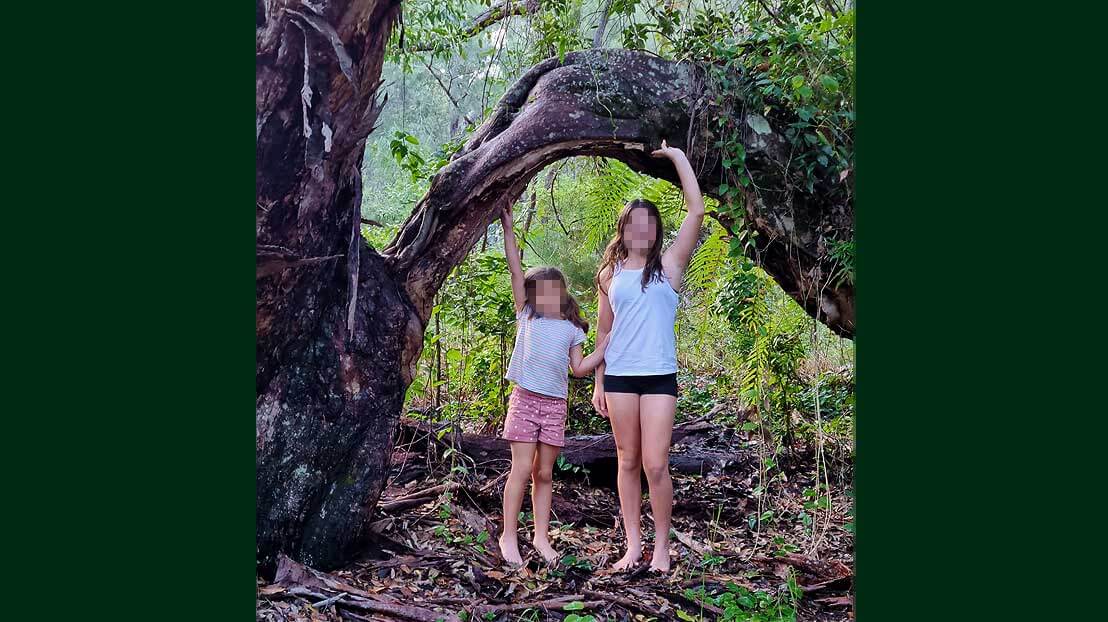
Happy Valley Township. This is the result of their evaluation. The black is a road that they're going to dedicate, which is the only way to get out of the valley for the ambulance, which is based in Happy Valley. Should there be a closure of the road in and out of the beach, which had happened on numerous occasions for various reasons. It floods, it washes away. The blue line is again the great walk. The purple area is the Education Department's block of land, their reserve. The council tried to negotiate to get the Education Department to relinquish it and turn it into council land so they could actually have a place to put a waste transfer station. At the moment they have access to the land, but that's a deal done between the Happy Valley Community Association and the Education Department. We'll look after your land, we'll look after the weeds.
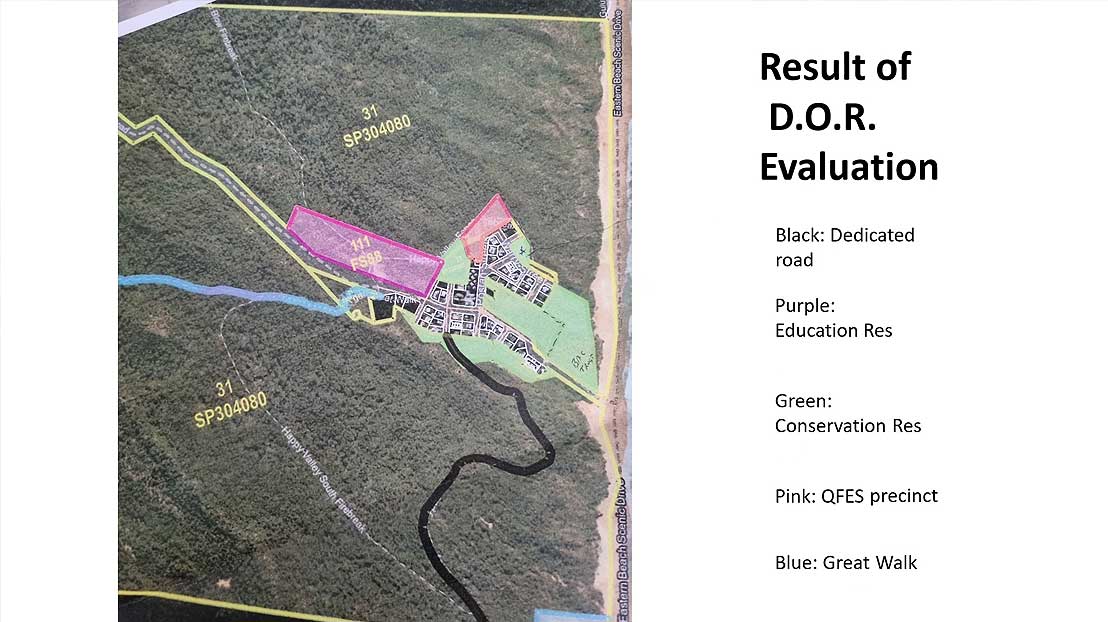
We'll keep it clear and clean and we'll look after the rubbish dump for somebody. And that's currently a situation. But the education department won't budge. They won't give it away. Not that there's going to be a school there because there's nowhere else to expand and there's not enough people there and certainly no children to be able to go to school. So what a waste of space which could be used. The area up the top there, which I think is pick, I suppose close enough, that's going to be a precinct for emergency services and it's being the Queensland Fire and Rescue Service, what it's called these days.
They are going to take tenure of that name. The green areas though, these reserves, conservation reserves this one down the bottom there, which will have BAC, the UX Aboriginal Corporation tenure. That is actually Esplanade where people used to walk to access the beach and now they're going to go cap in hand to the BAC and say, can we walk down the beach on the Esplanade please? They're fighting that in the middle of town. That block there is in the middle of town, very much like the two blocks in neuron in the middle between the two valleys. That land they have been looking after for years hasn't cost the department anything at all. They've done nothing there themselves. But the locals and a group called Fido Fraser Island Defenders Organisation have been cleaning the weeds up for years if that's handed over to the aboriginal community. I think so look, that's a very frustrating situation, not that it's happened yet. It's frustrating enough that can't get access in neuron to those areas where I used to walk as a child where my grandchildren played, where my own children played. I won't be able to take my great-grandchildren there. I took one grandchild there, great-grandchild, but not anymore.
I've had a long association with the island. I've lived at Ong for 17 years. My wife and I honeymooned over there. My father went there in 1929. It's just in the family. It's something that's precious special and I am cranking about losing opportunity to be there. But thank you.
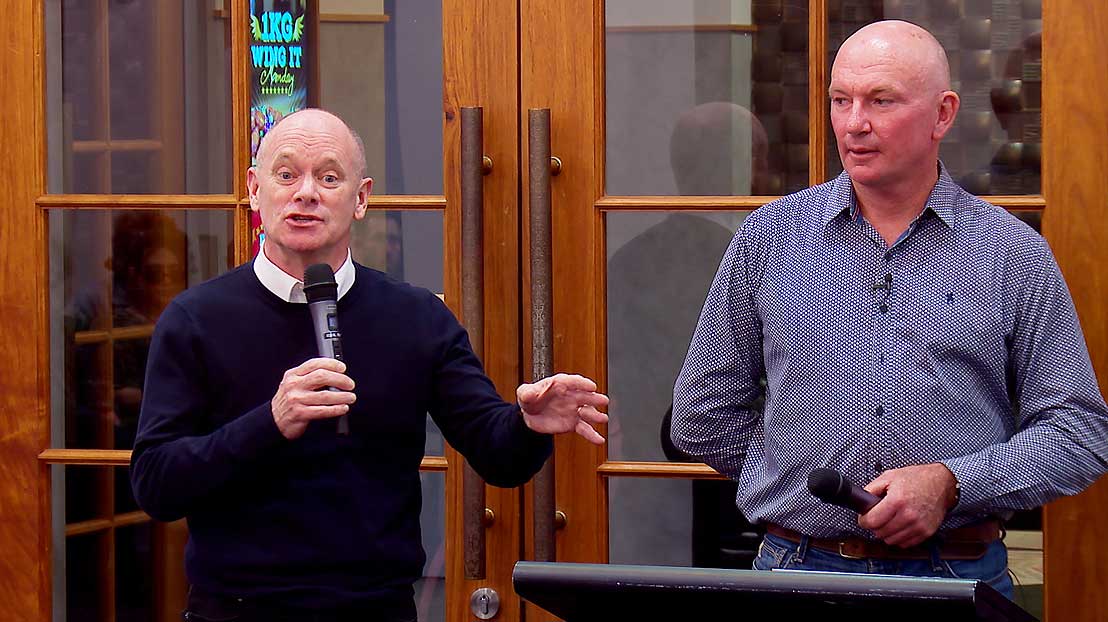
Campbell Newman:
Thanks very much, David. And if you now can't see how this could affect large slabs of Queensland, including Southeast Queensland, perhaps you haven't been listening hard enough because I think it's quite stark. This can happen down at the Redlands. It is happening in the Redlands. It can happen on the Sunshine Coast. Now that community, how many people on the Sunshine Coast now? 500, 800,000 people, if they think that they reserves their access, the places they've enjoyed aren't under threat. I think again, what we're going to do now, ladies, gentlemen, is have a bit of a panel. This is opportunity for you to ask questions or make points to the three gentlemen if I can ask them to come back up here. So over to you. Who wants to see the ball rolling?






